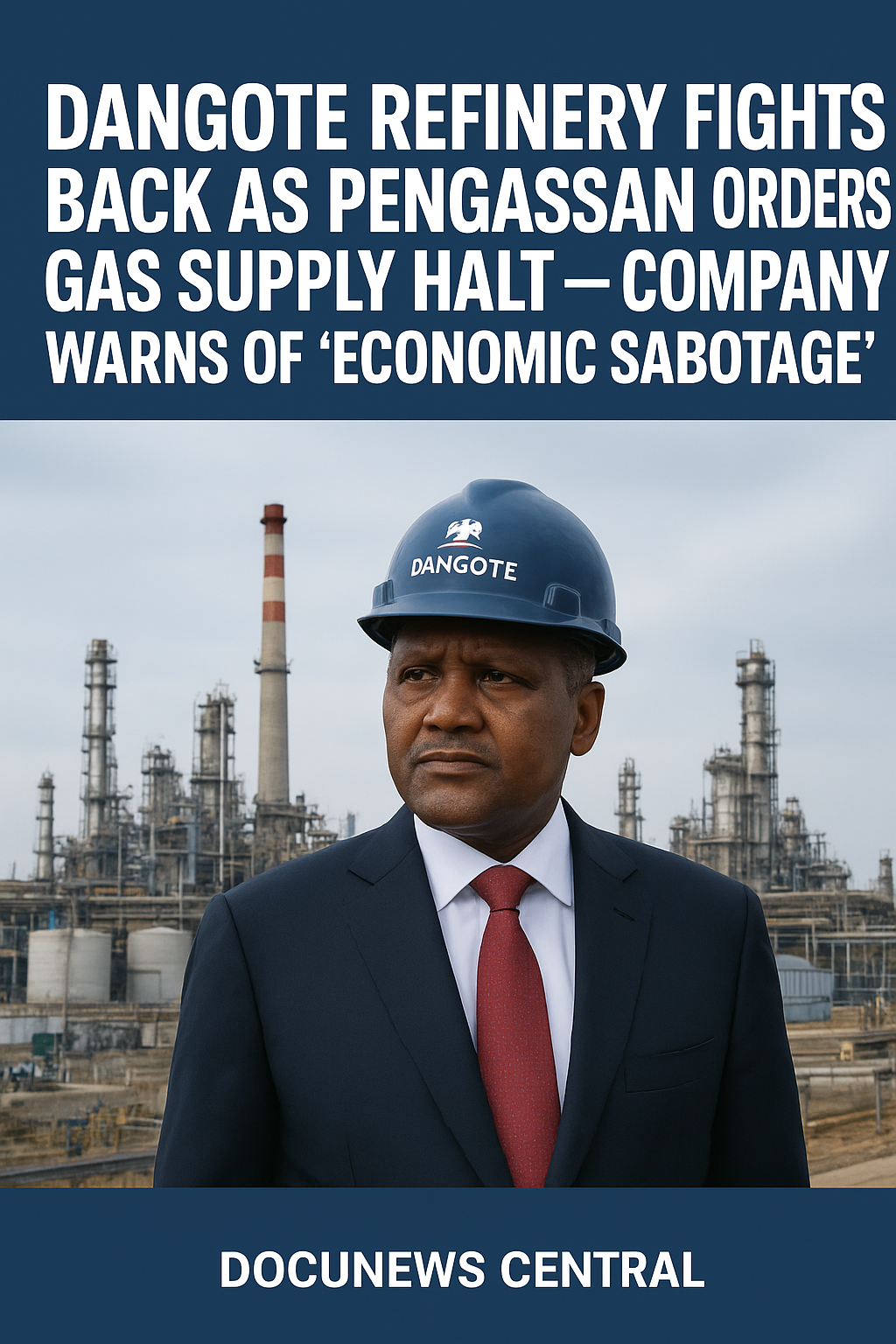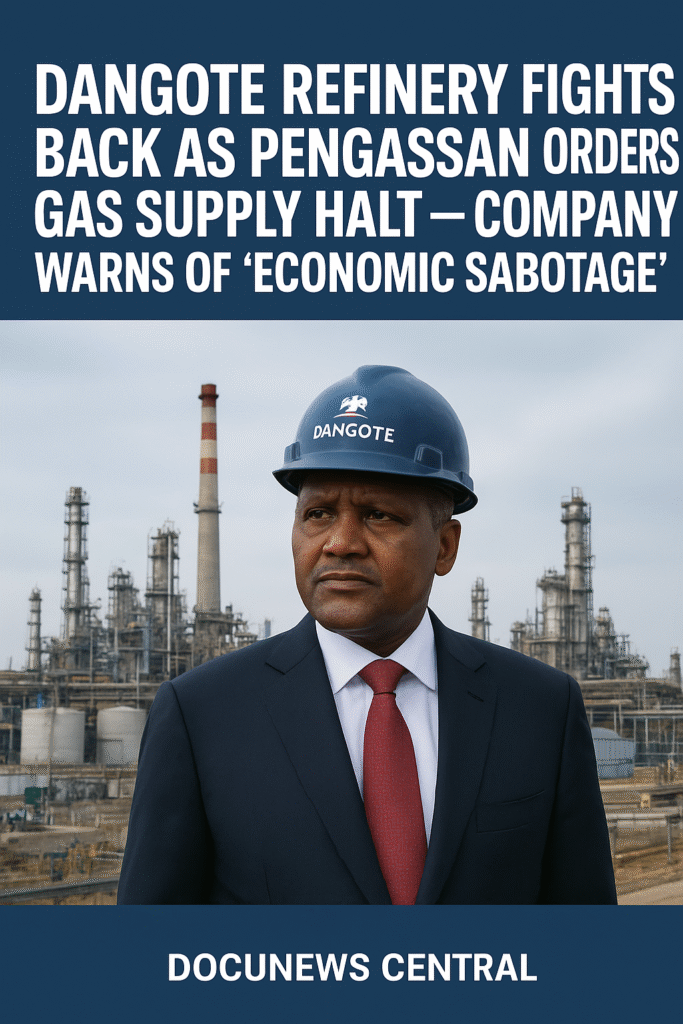

Dangote Refinery Fights Back as PENGASSAN Orders Gas Supply Halt — Company Warns of ‘Economic Sabotage’
Union Issues Shock Directive to Cut Crude and Gas Supply
A storm is brewing in Nigeria’s energy sector as the Petroleum and Natural Gas Senior Staff Association of Nigeria (PENGASSAN) has ordered an immediate suspension of crude and gas supply to the Dangote Petroleum Refinery and Petrochemicals.
The directive, issued late last week, instructs PENGASSAN branches in key oil and gas firms to stop all deliveries to the $20 billion refinery. The union also told workers to suspend vessel loading operations meant to move crude and gas to the giant facility.
PENGASSAN claims the drastic step is a response to what it calls the mass sacking of about 800 Nigerian staff, allegedly replaced with foreign workers.
Dangote Management Condemns the Order
The refinery’s management has fired back, describing the union’s action as “criminal, lawless and an act of economic sabotage.”
In a strongly worded statement, the company said PENGASSAN lacks the legal authority to interfere with private supply contracts already in place. Dangote warned that carrying out the union’s order could cripple fuel supply nationwide and frighten away investors.
According to the refinery’s spokesperson, any break in supply—even for a short time—would disrupt the production of petrol, diesel, aviation fuel, kerosene and cooking gas, causing an immediate ripple effect across the economy.
Risk of Fuel Shortage and Soaring Prices
The refinery stressed that Nigeria depends heavily on locally refined products to reduce costly imports. If supply to the plant is cut, fuel scarcity and price hikes could follow within days.
Dangote management warned that the directive would force the country back to large-scale fuel imports, increasing government spending and putting pressure on the naira.
Threat to Investor Confidence
The company also highlighted the danger to Nigeria’s investment image. “A situation where a trade union can stop supply to a multibillion-dollar refinery sends a terrible signal to investors,” the statement said.
Dangote described the refinery as a cornerstone of Nigeria’s economic future, stressing that such actions could damage long-term plans to attract foreign capital and build more large-scale industrial projects.
House of Representatives Steps In
Nigeria’s lawmakers have already moved to calm tensions. The House of Representatives Downstream Petroleum Committee called the union’s directive hasty and dangerous, warning that it could destabilise the entire downstream sector.
The committee appealed to PENGASSAN to suspend its order and urged both parties to resolve the dispute through dialogue.
Background to the Dispute
PENGASSAN claims that Dangote recently dismissed hundreds of Nigerian workers and brought in foreign nationals to replace them. The union says this violates labour agreements and undermines the rights of local workers.
Dangote has not denied that changes were made to its workforce but insists it is following all labour laws. It argues that the refinery’s staffing needs are based on technical requirements and global best practices.
Nigeria’s Biggest Refinery at the Centre of the Storm
The Dangote Refinery, built at a cost of around $20 billion, is designed to process 650,000 barrels of crude oil per day. It is one of Africa’s most ambitious industrial projects and a key part of Nigeria’s plan to achieve self-sufficiency in petroleum products.
The refinery has already started supplying some refined products to the local market and is expected to meet a large share of Nigeria’s fuel demand when fully operational.
Economists Warn of Wider Fallout
Energy analysts warn that disrupting the refinery’s operations could lead to rising transport costs, higher food prices and even power shortages in industries that rely on gas.
They caution that while workers have a right to protest, cutting crude and gas supply to the nation’s biggest refinery would hurt ordinary Nigerians more than the company itself.
Call for Government Intervention
Dangote management has called on President Bola Ahmed Tinubu’s government to act quickly. It wants the Ministry of Labour and the Ministry of Petroleum Resources to bring both sides to the table before the dispute triggers a national fuel crisis.
The company says it remains open to dialogue but will not accept any action it views as illegal and dangerous to the economy.
Uncertain Impact of the Union’s Directive
As of now, it is not clear how far the union’s order has been implemented. Some suppliers are said to be hesitant, while others await further instructions.
Analysts say the uncertainty alone is already creating tension in the energy market. Traders and consumers are watching closely to see whether the refinery will face an immediate shortage of crude or gas.
Operations Continue — For Now
Despite the threat, Dangote says its refinery is still running and that it has taken steps to keep critical supplies flowing. The company assured Nigerians that it is working with relevant authorities to maintain stable output.
However, energy experts warn that if the standoff continues without resolution, fuel queues and price spikes could appear within days, worsening Nigeria’s already high inflation.
A Test of Nigeria’s Industrial Future
This dispute is more than a clash between a company and a union. It is a test of how Nigeria balances workers’ rights with the need to protect major private investments.
Observers say the outcome will set a precedent for future labour disputes in the country’s vital oil and gas sector.
For now, the nation watches as the battle between Dangote and PENGASSAN unfolds — a conflict with stakes far beyond one refinery and consequences that could touch every Nigerian household.








